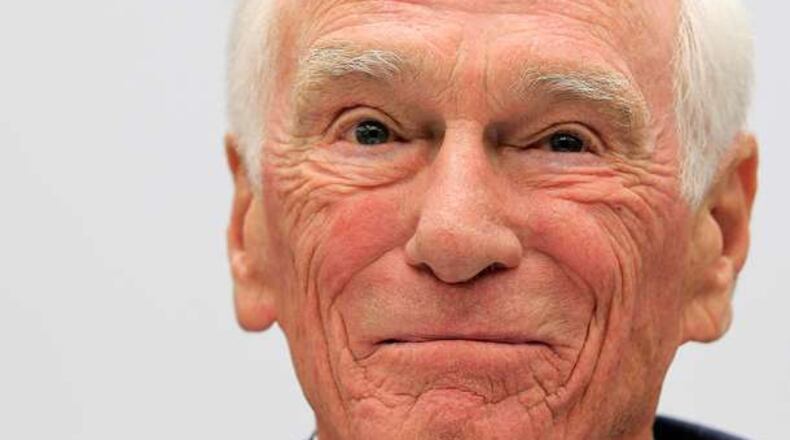Cernan was awarded the Neil Armstrong Outstanding Achievement Award in October at the enshrinement ceremony of the National Hall of Fame inside the Air Force museum at Wright-Patterson Air Force Base. He was too ill to attend, however, and former NASA Mission Control Director Eugene Kranz, a Toledo native who gained fame during the troubled Apollo 13 mission, accepted the award behalf of Cernan.
The former naval aviator and NASA astronaut was inducted into the Hall of Fame in 2000 in the same class as Buzz Aldrin, the second man to walk on the moon, said Ron Kaplan, enshrinement director.
Cernan, also the second American to walk in space, returned to Dayton in 2003 among 22 National Aviation Hall of Fame enshrinees to participate in the “Pioneers of Flight Homecoming,” the same year marking the centennial of the Wright brothers’ historic first flight.
Cernan would mention the two honors among the many he received that he held most important were his induction into the Naval Aviation Hall of Honor and the former Apollo and Gemini astronaut’s enshrinement into the National Aviation Hall of Fame, Kaplan said.
“I heard him tell people that many times over the years,” he said in an interview Monday.
Cernan made his way to NASA from as an aircraft carrier pilot with a Navy attack jet squadron, not the typical route of a fighter pilot becoming a test pilot and then joining NASA, Kaplan said.
Cernan, Kaplan added, kept his carrier squadron mates fighting in the Vietnam War in mind while he trained in the astronaut corps.
“He was very reflective while his buddies were getting shot at he was in training to go to the moon,” Kaplan said.
Credit: Chris Stewart
Credit: Chris Stewart
NASA said that Cernan logged more than 566 hours in space, 73 of which were on the moon.
Cernan served in Gemini 9A, Apollo 10 and Apollo 17 missions in the 1960s and 1970s. Cernan served as spacecraft commander of Apollo 17, the last scheduled manned mission to the moon for the United States, in December 1972.
He since received a number of awards and decorations for his work.
The Associated Press contributed to this report.
About the Author

